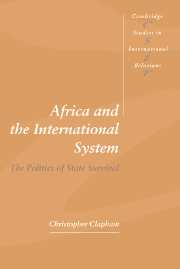Book contents
- Frontmatter
- Contents
- Acknowledgements
- List of acronyms and abbreviations
- Part I African states and global politics
- Part II Patterns of alliance
- Part III Struggling with decay
- 7 The international politics of economic failure
- 8 The Externalisation of political accountability
- 9 The International politics of insurgency
- 10 The privatisation of diplomacy
- 11 Conclusion
- Notes
- Bibliography
- Index
- CAMBRIDGE STUDIES IN INTERNATIONAL RELATIONS 50
8 - The Externalisation of political accountability
Published online by Cambridge University Press: 09 October 2009
- Frontmatter
- Contents
- Acknowledgements
- List of acronyms and abbreviations
- Part I African states and global politics
- Part II Patterns of alliance
- Part III Struggling with decay
- 7 The international politics of economic failure
- 8 The Externalisation of political accountability
- 9 The International politics of insurgency
- 10 The privatisation of diplomacy
- 11 Conclusion
- Notes
- Bibliography
- Index
- CAMBRIDGE STUDIES IN INTERNATIONAL RELATIONS 50
Summary
The decline of sovereignty
Over a period of close to thirty years after independence, African rulers were remarkably successful in protecting their control over their domestic political systems against external pressures for change. Whereas the domestic economies of African states were heavily penetrated by external forces which limited the power of the state, African governments were to a very large extent left free to manage domestic politics as they wished. Although control over the economy was often a matter of aspiration, political control was for the most part a matter of fact. Domestically, while the withdrawal of rural producers from markets controlled by national governments had an important impact on state revenues, an equivalent withdrawal from political participation merely left the government with the freedom to operate as it wished. In terms of regional relationships, though few African states could control their frontiers against smuggling, they were generally far less threatened – save in parts of southern Africa and the Horn – by cross-border political movements. African rulers understandably supported the principle of unrestricted domestic sovereignty, and at least for the first two decades after independence, even the most muted criticism of the internal autocracy of other African states was virtually non-existent. Most evidently of all, the major external (and especially capitalist) powers which continued to exercise influence over African economies were for the most part unconcerned about any equivalent influence on domestic political structures. Regardless of their commitment (in most cases) to liberal democracy within their own territories, there was no attempt by Western states to protect the multiparty political systems which they had established in colonial territories as a prelude to decolonisation.
- Type
- Chapter
- Information
- Africa and the International SystemThe Politics of State Survival, pp. 187 - 207Publisher: Cambridge University PressPrint publication year: 1996



